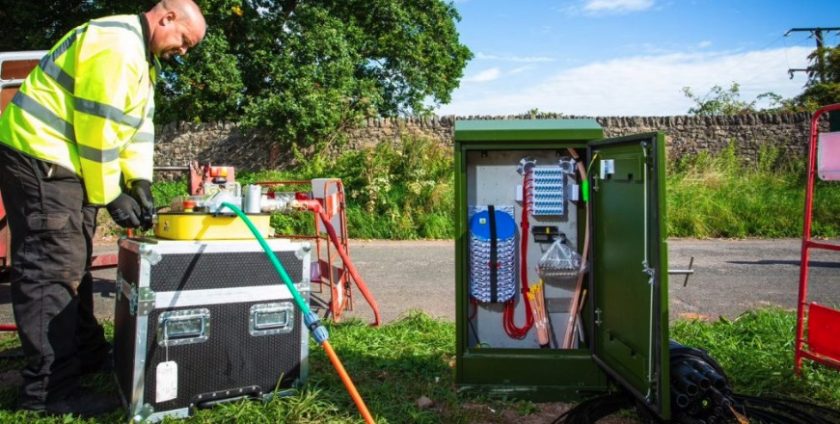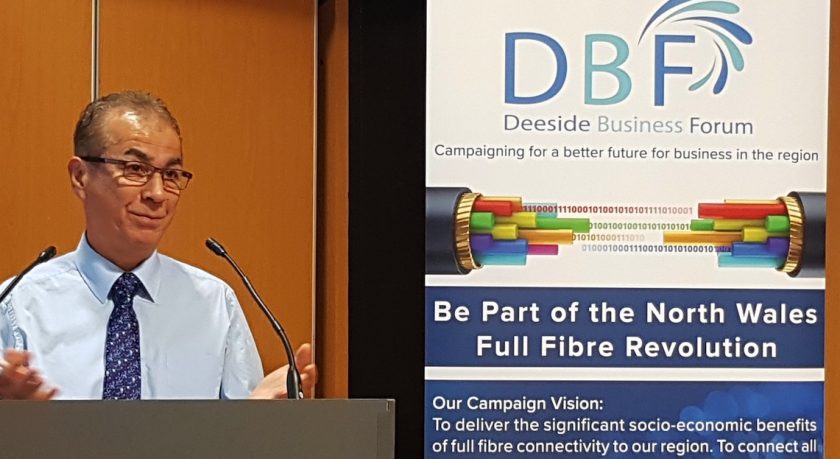New figures from Deeside Business Forum show region needs at least £120m for full fibre digital connectivity

A business forum leading on digital connectivity is spelling out exactly why North Wales needs at least £120m to make the region digitally connected.
DBF (Deeside Business Forum) has been consistently campaigning to deliver the significant socio-economic benefits of full fibre connectivity to North Wales, to connect all buildings with ultrafast connectivity, and to establish the region as the most attractive location for business growth and investment.
In May the forum stated that in order to create highly-skilled well-paying jobs for the area, digital connectivity has to be the number one priority of the North Wales Growth Deal.
DBF revealed figures that demonstrate why this project needs a minimum of £120m, not the £34m currently allocated.
Laying fibre for ultrafast connectivity costs between £40 and £100 per metre.
Taking a below average cost of between £50.92 and £50.93 per metre, it would cost £120m to connect all of North Wales’ 2,375.90km of A and B roads.
Altogether, including C and minor surfaced roads, North Wales has a total of 9,732.40km of road, which would cost in excess of £495m to install with fibre.

[Askar Sheibani]
“DBF has 2,500 plus businesses from North Wales and North West England on its books,” said chairman Askar Sheibani.
“The reason we will keep campaigning for full fibre ultrafast connectivity for the region is because we have the best interests of our businesses and communities at heart, and this is what they need.
“They need the best connectivity speeds possible so they can develop and compete and keep providing high quality jobs for the people of North Wales.
“We hope these figures make it crystal clear why digital connectivity needs as much capital from the North Wales Growth Deal as it is possible to invest.”
Mr Sheibani announced earlier this month that a team of experts on digital connectivity is being put together to advise the North Wales Growth Deal’s administrators North Wales Economic Ambition Board.
Currently North Wales is one of the worst regions in the UK for digital connectivity. Businesses based in the area who want to compete on a national and international level can be hampered by bills of around £700 per month for a 100 Meg lease line fibre-based broadband.
DBF has been campaigning to improve digital connectivity in North Wales for some years, organising several well-attended conferences on the subject.
February 2018’s conference, ‘Full Fibre Digital Connectivity for North Wales’, was the first UK-based fibre connectivity conference organised exclusively to advance the knowledge of attendees on the socio-economic benefits of full fibre broadband in North Wales.
What is Full Fibre Broadband
At the moment, broadband connections are delivered using a mix of fibre-optic cables and the old copper cables, which have been in place for decades, originally to deliver telephone services.
This system uses a copper connection between your home or business and the nearest green street cabinet.
But some people can have trouble with copper connections.
These can be caused by the distance from your home to the cabinet, or by lots of people using the internet at the same time.
These problems can make your broadband connection unreliable and you might not get the broadband speeds your provider advertised.
Full-fibre broadband helps to deal with problems like these.
Full-fibre broadband uses fibre-optic cables to connect your home to the street cabinet, replacing the old copper connections.
Full-fibre connections provide a better service that can deliver much faster speeds – up to one gigabit per second. They are also up to five times more reliable than connections that used the old copper cables.
Full-fibre connections are also less likely to slow down or suffer problems when lots of people use them at the same time.
This means your broadband is more likely to reach the speeds close to those that were advertised.
All of this means there is potential for lots of new, innovative services for consumers and businesses, which use the faster, more reliable connections.
Feature Image: www.gigaclear.net
Spotted something? Got a story? Email: [email protected]
Latest News
